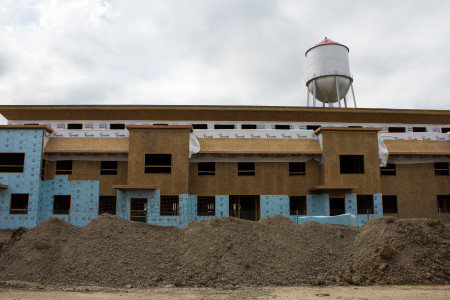
Grinnell College is facing expanding competition in the market of residential campuses in Grinnell, as the Mayflower Community, which provides retirement homes, is expanding to offer new residency options.
The new residency will be called the Watertower Square Residences and will add 40 residents to the campus of 240 people living in 50 free standing “patio homes,” internal campus apartments, assisted living, nursing facilities and memory support.
Construction on the site started in August and the first residents are expected to move in early July. The expansion is necessary to meet the community’s future needs.
“We worked with a couple of different consultants and then did a marketing research study that said, long story short, that the growth in this age contingent is going to be steady and increasing over the next 15 years or so,” said Bob Mann, the executive director of the Mayflower Community.
This led to the design and construction of the Watertower Square Residents. Because the new construction will add a significant number of residents to the community, the Mayflower had to be deliberate about their construction plans.
“I worked with a long-term living facility in Des Moines before I came here that built a very, very nice apartment building and you couldn’t get into it if you didn’t have the number code,” Mann said. “It was connected to the rest of the campus but the people who lived there had the code and they could walk in and if you didn’t live there, you couldn’t go in. And so what happened is it really split the community. It was like those people in the tower versus us normal people.”
To prevent this split, the Mayflower chose not to build dining, exercise or other community spaces in the new residences and to connect them to the other parts of campus by an underground tunnel. Additionally, to be more intentional about the integration of the new residents to the community they created a special task force to assist in the transition.
“We have a representative from our board of trustees, three representatives from the Mayflower Residents Association, which is a self-governing body of our own residents … three staff members and one new resident who already lives here but is going to move into the building, so seven people are what we call the Watertower Square Assimilation Taskforce. And they are working on a variety of projects.”
The residents moving to the new residences will live independently but benefit from the resources the Mayflower Community provides.
“So we’re kind of the no grass and no snow … world that, when people are done mowing and shoveling and all the other things related to maintaining their own homes, we become attractive because we do all that kind of work for them,” Mann said. “We call it ‘shrinking their world to a manageable size.’ They can spend their the time continuing to grow intellectually—auditing classes at school, being involved in activities in the community, that sort of thing and not having to maintain yards and grass and that sort of thing.”
Some of the new residents are connected to the College and will join the already thriving community of Mayflower residents who are intimately connected to the College as alumni or former instructors. Mann believes that this connection benefits the Mayflower Community and its residents.
“One of the highlights is therefore, as you would guess, there are some wonderful minds who live here and those minds are behind some wonderful stories,” Mann said.
For all of the residents, however, the Mayflower provides a positive community for them to enter into as they retire.
“People don’t come here to die. They come here to have the next stage of their life, whatever that is,” Mann said.


















































